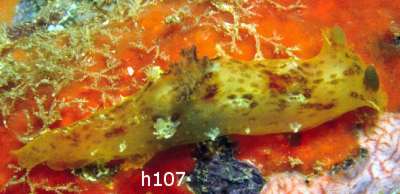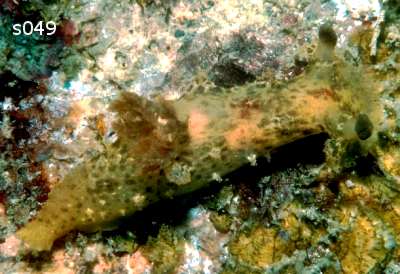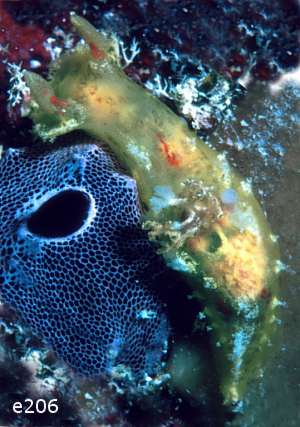New distribution records for Plocamopherus maculatus
April 29, 2005
From: Scott Johnson


Hi Bill,
I noticed that Plocamopherus maculatus is thought to be restricted to Hawaii. Actually, I have also found the species here in the Marshall Islands and in the Solomon Islands as well. H107 shows a Hawaiian specimen, while E206 was photographed at Kwajalein, Marshall Islands, and S049 off Guadalcanal in the Solomons. It is primarily found at night, usually wandering around in ledges and small caves at depths of about 5 to 20 meters. This is one of those species that "lights up" when disturbed, with spots of glowing light that last a few seconds after the animal is touched. I seem to remember this was the feature that encouraged me to misidentify it as P. tilesii in Hans Bertsch's and my Hawaiian Nudibranchs (page 81); I had read of similar phosphorescence in P. tilesii and figured ours was a variation - now an obvious error. It is a fascinating species and does indeed use that flattened tail to swim upside down if it falls off the cave walls.
Since the three specimens pictured are from different areas, I'm including three sets of data:
H107 Pupukea, Oahu, Hawaii; Depth 14m; Length 30mm; Date 21 April 1985, night dive; crawling in ledge; Photographer: Scott Johnson.
E206 Kwajalein Atoll, Marshall Islands; Depth 10m; Length 32mm; Date 4 September 1989, daytime; under rock; Photographer: Scott Johnson.
S049 Boneghi, Guadalcanal, Solomon Islands; Depth 15m; Length 26mm; Date 26 August 1987, night dive; in small ledge; Photographer: Scott Johnson
-
Bertsch, H. & Johnson, S., 1981. Hawaiian Nudibranchs. Honolulu: Oriental Publishing Co.
Scott:
uwkwaj@yahoo.com
Johnson, S., 2005 (Apr 29) New distribution records for Plocamopherus maculatus. [Message in] Sea Slug Forum. Australian Museum, Sydney. Available from http://www.seaslugforum.net/find/13665
Thanks Scott,
It's good to get a better idea of this species, and you records, especially from the Solomons certainly suggest we should look through our unidentified species from the Indo-West Pacific.
Best wishes,
Bill Rudman
Related messages
-
Plocamopherus maculatus from Hawaii
From: Keoki Stender, November 14, 2003
